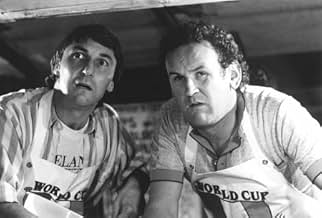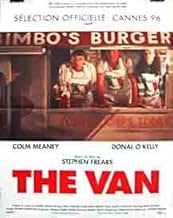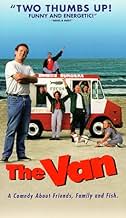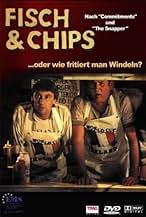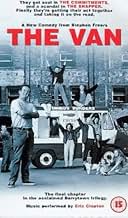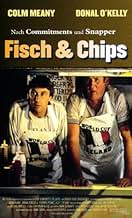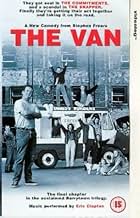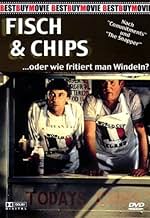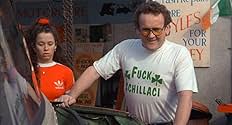Set in the fictional Dublin suburb of Barrytown, Bimbo is a baker who loses his job after being made redundant. Bimbo then acquires the help of his best friend, Larry, to set up a successful... Read allSet in the fictional Dublin suburb of Barrytown, Bimbo is a baker who loses his job after being made redundant. Bimbo then acquires the help of his best friend, Larry, to set up a successful burger van.Set in the fictional Dublin suburb of Barrytown, Bimbo is a baker who loses his job after being made redundant. Bimbo then acquires the help of his best friend, Larry, to set up a successful burger van.
- Awards
- 1 nomination total
Featured reviews
Booker prize winner Roddy Doyle , who started life as a school teacher in a depressed neighbourhood in Dublin, the capital of Ireland, offers us a vivid yet humorous slice of life in Dublin at a pivotal time in contemporary Irish history. He tells this story from the perspective of down trodden families living in a depressed yet resilient neighbourhood. What is truly brilliant about this film is not just the hilarious storyline or the magical performances but how it captures the moment when Ireland as a nation got back on its feet and began to embrace Europe and world with renewed confidence. The story is set during the monumental moments of the European Football Championships of 1988, EURO'88 , when the Irish soccer team surprised Europe, and not least the Irish, with their success. It has been said that this event and the continued success of the Irish soccer team in Italia 90 sparked a renewed confidence within Ireland which greatly contributed to the success of the Irish economy in recent years, now known as the Celtic Tiger. The Barrytown trilogy written by Doyle has given us 3 memorable film adaptations in 'The Commitments'; 'The Snapper' and now this the final episode 'The Van'. Roddy Doyle went on to win the Booker prize for 'Paddy Clarke , ha, ha, ha' and is one of the foremost novelists active in Ireland today. His comedy and dialogue use the often thick Dublin working class dialect, which add to the lyrical nature of the scenes. Most of the characters are in turmoil due to their circumstances and the comedy lies in their posturing with each other in a dead-pan, black comedy.
In November 1989, in Ireland, the baker Bimbo (Donal O'Kelly) is fired from his job and he does not feel comfortable with the situation. His best friend Larry (Colm Meaney), who is also unemployed and living with his low welfare with his wife Mary (Caroline Rothwell) and their children, is resigned with his situation and tries to console his friend. But Bimbo is supported by his wife Maggie (Ger Ryan) and decides to buy an abandoned van without engine in a junkyard to open a business of hamburger, French fries and fried codfish and invites Larry to work with him. Soon they have financial success but their friendship is compromised.
"The Van" is a dramatic comedy directed by Stephen Frears that has a funny and exciting beginning and an unpleasant conclusion. The friendship of Larry and Bimbo is beautiful to see and their success is what every viewer expects to see. However, the final twist with the attitude of the big-mouth and envious Larry is disappointing. Maybe the bitter story is more realistic this way but I would prefer a happy ending, valuating friendship and hard work. My vote is five.
Title (Brazil): "A Van" ("The Van")
"The Van" is a dramatic comedy directed by Stephen Frears that has a funny and exciting beginning and an unpleasant conclusion. The friendship of Larry and Bimbo is beautiful to see and their success is what every viewer expects to see. However, the final twist with the attitude of the big-mouth and envious Larry is disappointing. Maybe the bitter story is more realistic this way but I would prefer a happy ending, valuating friendship and hard work. My vote is five.
Title (Brazil): "A Van" ("The Van")
"The Van" is one of very few novels that have made me laugh out loud, on numerous occasions, whilst reading it. Thus, I feared the movie couldn't possibly live up to the book and I was right.
The characters appear nowhere near as appealing as they do in the book -even the lead characters name has changed from Jimmy to Larry. In fact the Rabbite family has been drastically culled. The dialect can be difficult to catch at times (my wife mistook "World Peace" for "Wolf's p**s" during one pun). The "Living Dead" appear from nowhere and........no, I'm not doing any more comparisons.
If you want a good laugh read the book.
The characters appear nowhere near as appealing as they do in the book -even the lead characters name has changed from Jimmy to Larry. In fact the Rabbite family has been drastically culled. The dialect can be difficult to catch at times (my wife mistook "World Peace" for "Wolf's p**s" during one pun). The "Living Dead" appear from nowhere and........no, I'm not doing any more comparisons.
If you want a good laugh read the book.
Two Irish men with wives and children find themselves on the dole. One of them buys a large van and turns it into a "chippy." Naturally, he asks his best friend to work there with him. These two approaching-middle-age men have to work incredibly hard, but do have some success at the venture. It doesn't take long, however, for the friendship to get in the way. The one who fronted the money for the van is the boss, and the other one who didn't put up any money to get the small business going is the employee, who eventually becomes bitter at drawing a weekly paycheck from his best friend, who joins a union and begins antagonizing his best friend about labor laws, and whose insecurity in life shows clearly -- after all, the job isn't glamorous by any means, and of course, the reality of it is far removed from his dreams, we should imagine. The tension grows between the two. Set in Ireland during a World Cup Finals competition in soccer, this film gives us an intimate, grungy peek at the everyday realities of the poor in Ireland. It's "grand" to venture forth and set up one's own business and get off the dole, but of course, things are unlikely to run smoothly.
This is the story of two men belonging to the the Irish working class who after being sacked decide to start a business with a van for making and selling hamburgers and the like stuff. After a while their mutual relationship turns into a boss-employee one and things began to become worse until because friendship is thicker than money they began again to get well along with each other. The story is told in a half serious half funny way. It's very simple but not the less deep because of that. It's full of amusing episodes and details of everyday life but its very true, authentic and realistic.
Did you know
- TriviaThis is the third story in Roddy Doyle's "Barrytown Trilogy", following the adventures of the Rabbitte family. However, as 20th Century Fox owned the film rights to the Rabbitte name (from The Commitments), the characters had to be re-named in the subsequent film adaptations (The Snapper, The Van).
- GoofsThe movie is set during World Cup 1990, and on at least two occasions, the radio can be heard promoting 98FM. This station did not use this branding until the mid 1990s; it was called Classic Hits at the time.
- Alternate versionsIn the UK in 2007 a re-edited version was passed for certification for video release by the BBFC running at 92 minutes 50 seconds, some 3 minutes 55 seconds shorter than the normal theatrical version.
- SoundtracksWand'rin' Star
Words by Alan Jay Lerner
Music by Frederick Loewe
© Alan Jay Lerner/Frederick Loewe/Chappell & Co Inc
By Kind Permission of Warner Chappell Music Limited
- How long is The Van?Powered by Alexa
Details
- Release date
- Countries of origin
- Official site
- Language
- Also known as
- La camioneta
- Filming locations
- Production companies
- See more company credits at IMDbPro
Box office
- Gross US & Canada
- $712,095
- Opening weekend US & Canada
- $23,366
- May 18, 1997
- Gross worldwide
- $714,197
- Runtime1 hour 40 minutes
- Color
- Sound mix
- Aspect ratio
- 1.85 : 1
Contribute to this page
Suggest an edit or add missing content


